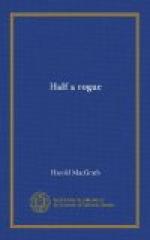Chapter XV
The anonymous letter is still being written. This is the weapon of the cowardly and envious heart, so filled with venom and malice that it has the courage or brazenness to go about piously proclaiming the word duty. Beware of the woman who has ink-stains on her fingers and a duty to perform; beware of her also who never complains of the lack of time, but who is always harking on duty, duty. Some people live close to the blinds. Oft on a stilly night one hears the blinds rattle never so slightly. Is anything going on next door? Does a carriage stop across the way at two o’clock of a morning? Trust the woman behind the blinds to answer. Coming or going, little or nothing escapes this vigilant eye that has a retina not unlike that of a horse, since it magnifies the diameter of everything nine times. To hope for the worst and to find it, that is the golden text of the busybody. The busybody is always a prude; and prude signifies an evil-minded person who is virtuous bodily. They are never without ink or soft lead-pencils. Ink has accomplished more wonderful things than man can enumerate; though just now a dissertation on ink in ink is ill-timed.
To return again to the anonymous letter. Add and multiply the lives it has wrecked, the wars brought about. Menelaus, King of the Greeks, doubtless received one regarding Helen’s fancy for that simpering son of Priam, Paris. The anonymous letter was in force even in that remote period, the age of myths. It is consistent, for nearly all anonymous letters are myths. A wife stays out late; her actions may be quite harmless, only indiscreet. There is, alack! always some intimate friend who sees, who dabbles her pen in the ink-well and labors over a backhand stroke. It is her bounden duty to inform the husband forthwith. The letter may wreck two lives, but what is this beside stern, implacable duty? When man writes an anonymous letter he is in want of money; when woman writes one she is in want of a sensation. It is easy to reject a demand for money, but we accept the lie and wrap it to our bosoms, so quick are we to believe ill of those we love. This is an aspect of human nature that eludes analysis, as quicksilver eludes the pressure of the finger. The anonymous letter breeds suspicion; suspicion begets tragedy. The greatest tragedy is not that which kills, but that which prolongs mental agony. Honest men and women, so we are told, pay no attention to anonymous letters. They toss them into the waste-basket ... and brood over them in silence.
Now, Mrs. Franklyn-Haldene was always considering her duty; her duty to the church, to society, to charity, and, upon occasions, to her lord and master.
“Bennington’s men have gone out, the fools!” said Haldene from over the top of his paper.
“Have they?” Mrs. Franklyn-Haldene nibbled the tip of her pen. She sighed, tore up what she had written and filtered it through her fingers into the waste-basket.




